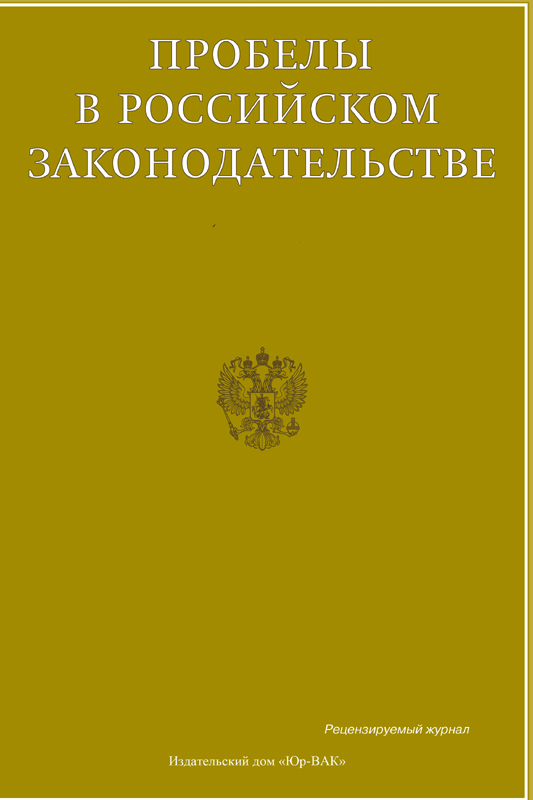On the Issue of the Impact of Re-Socialization on the Mechanism of Countering Recidivism
- Authors: Shkhagapsoev Z.L.1, Akkaeva H.A.1
-
Affiliations:
- North Caucasus Institute for Advanced Studies (branch) of Krasnodar University of the Ministry of Internal Affairs of Russia
- Issue: Vol 16, No 2 (2023)
- Pages: 201-204
- Section: Criminal Law Sciences
- URL: https://journals.eco-vector.com/2072-3164/article/view/568841
- ID: 568841
Cite item
Abstract
The problem of recidivism is especially acute at the present time. This fact is due to the socio-economic problems faced by persons released from places of deprivation of liberty.
Crimes committed by recidivists are characterized by increased social danger, since often the level of preparation for them is much higher than for crimes committed by persons for the first time. In this regard, along with the goals of punishment set for the bodies of the penitentiary system, no less significant is the implementation of functions aimed at assisting convicts in resocialization and social adaptation after release from places of deprivation of liberty.
Of great importance in solving such problems is the resocialization and social adaptation of convicts, the effective implementation of which contributes to counteracting recidivism.
The article notes the relevance and importance of the institution of probation, regulated at the legislative level in February 2023, which seems to be an important step towards the formation of an effective mechanism for the resocialization of persons released from places of deprivation of liberty.
Full Text
About the authors
Zaurbi L. Shkhagapsoev
North Caucasus Institute for Advanced Studies (branch) of Krasnodar University of the Ministry of Internal Affairs of Russia
Author for correspondence.
Email: Lel4993@mail.ru
Dr.Sci.(Law), Police Colonel, Head
Russian Federation, NalchikHalimat A. Akkaeva
North Caucasus Institute for Advanced Studies (branch) of Krasnodar University of the Ministry of Internal Affairs of Russia
Email: Lel4993@mail.ru
Cand.Sci.(Law), Police Colonel, Head of the Department of Special Technical Disciplines
Russian Federation, NalchikReferences
- Kalėjimų departamento prie Lietuvos Respublikos teisingumo ministerijos direktoriaus 2004 m. geguzes 24 d. Isakymu Nr. 4/07-132 «TIPINĖ NAUJAI ATVYKUSIŲ Į PATAISOS ĮSTAIGĄ NUTEISTŲJŲ ADAPTACIJOS PROGRAMA». URL: https://e-seimas.lrs.lt/rs/legalact/TAD/TAIS.234296/.
- Aleksandrov B.V. Motivation of convicts to labor as one of the conditions for their resocialization // Applied Legal Psychology. 2019. No. 1 (46).
- Anfinogenov V.A. On the issue of the role of labor adaptation of convicts held in correctional institutions // Gaps in Russian legislation. 2019. No. 2.
- Golovin N.A. Modern Sociological Theories: Textbook and Workshop. M., 2018.
- Laverycheva S.A., Fedorova E.M. On the determinants of recurrent penitentiary and post-penitentiary crime // Gaps in Russian legislation. 2018. No. 3.
- Musatova E.E. The main ways of implementing social and educational work with convicts // Penitentiary policy and issues of execution of criminal penalties: Sat. mater. Int. scientific-practical. conf. In 2 volumes. Volume 2. Ryazan, 2016. P. 888.
- Indicators of crime in Russia. URL: http://crimestat.ru/offenses_rate
- Project of resocialization: actual problems from «zeroing» to «escape». URL: https://centrra.ru/proekt-resotsializatsii-aktualnye-problemy-ot-obnuleniya-do-pobega-2/.
- Timofeeva E.A. The Institute for the Resocialization of Prisoners in Foreign Penitentiary Systems: State, Problems and Possibility of Integration of Best Practices // Bulletin of the Vladimir Law Institute. 2018. No. 3 (48).
- Titov M.E. On the problem of resocialization of convicts // Actual problems of penitentiary science and practice. 2018. No. 2 (10).
Supplementary files









